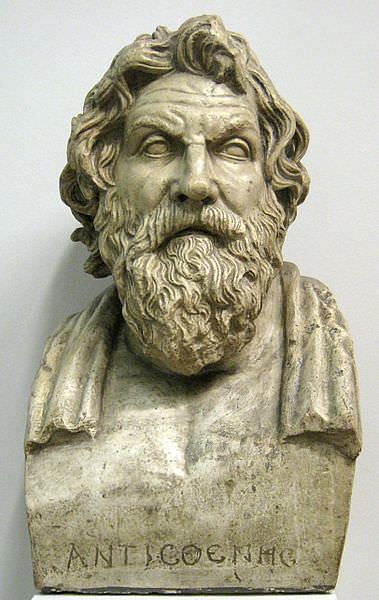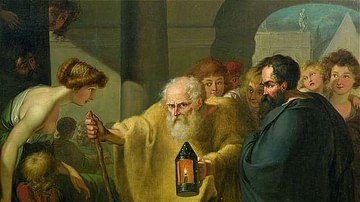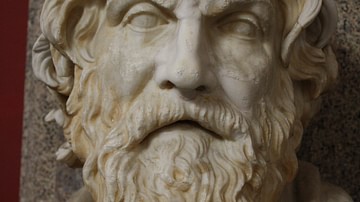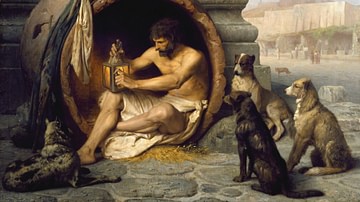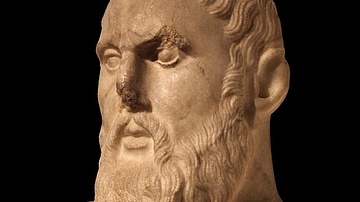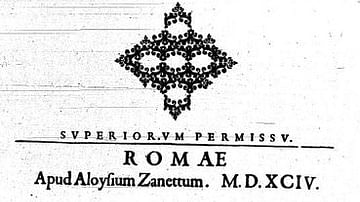Antisthenes (c. 445-365 BCE) was a Greek philosopher who founded the Cynic School of Athens. He was a follower of Socrates and appears in Plato's Phaedo as one of those present at Socrates' death. He is one of the primary interlocutors in Xenophon's works Memorabilia and Symposium. Antisthenes, like Crito, was among the older students of Socrates', and Charles Kahn writes that he was regarded as Socrates' most important follower. He believed that virtue could be taught and that only the virtuous were truly noble. It is interesting to note, however, that this claim directly opposed Socrates' view as given by Plato. In Plato's dialogue of the Meno, Socrates argues argued that virtue could not be taught (or else noble fathers would have produced noble sons and such was not, empirically, the case), but Antisthenes argued otherwise in that he had learned virtue from Socrates and, therefore, virtue clearly could be taught.
Socrates' students all founded philosophical schools of one kind or another, and all of them were so diverse that it is a testimony to the expansive quality of Socrates' philosophy that so many men could interpret his teachings in such different ways. The hedonistic philosopher Aristippus, for example, claimed to be following Socrates' example by living a life in pursuit of pleasure, while Plato claimed he was carrying on Socrates' vision through an ascetic discipline of the mind. Antisthenes, also, asserted that his philosophy was grounded in Socrates' original vision. It seems almost impossible that Aristippus, Plato, and Antisthenes could have had the same teacher, so different are their philosophies at first glance. Underlying all three, however, is that very same virtue which Socrates held so dear: the importance of being free to be true to oneself and one's own convictions in life. The Cynic School that Antisthenes founded stressed the importance of prevailing over adversity by acceptance of it, that arete is the same for women as it is for men, and that this personal excellence is displayed in deed more so than in word. These same values, expressed differently, were taught by both Plato and Aristippus.
Antisthenes died in Athens of a degenerative disease which may have been consumption. He is said to have regarded his illness and impending death with a calm serenity as simply another part of the life he had so enjoyed.
Ancient sources claim that he was a prolific writer and also that he wrote nothing. These sources are no longer extant but are preserved in the work of Diogenes Laertius, The Lives and Opinions of Eminent Philosophers (3rd century CE) which gives brief biographical sketches of those Greek thinkers Laertius felt were the most important. His Life of Antisthenes of Athens is here given below. The translation is by C.D. Yonge.
I. ANTISTHENES was an Athenian, the son of Antisthenes. And he was said not to be a legitimate Athenian; in reference to which he said to some one who was reproaching him with the circumstance, "The mother of the Gods too is a Phrygian;" for he was thought to have had a Thracian mother. On which account, as he had borne himself bravely in the battle of Tanagra, he gave occasion to Socrates to say that the son of two Athenians could not have been so brave. And he himself, when disparaging the Athenians who gave themselves great airs as having been born out of the earth itself, said that they were not more noble as far as that went than snails and locusts.
II. Originally he was a pupil of Gorgias the rhetorician; owing to which circumstance he employs the rhetorical style of language in his Dialogues, especially in his Truth and in his Exhortations. And Hermippus says, that he had originally intended in his address at the assembly, on account of the Isthmian games, to attack and also to praise the Athenians, and Thebans, and Lacedaemonians; but that he afterwards abandoned the design, when he saw that there were a great many spectators come from those cities. Afterwards, he attached himself to Socrates, and made such progress in philosophy while with him, that he advised all his own pupils to become his fellow pupils in the school of Socrates. And as he lived in the Piraeus, he went up forty furlongs to the city every day, in order to hear Socrates, from whom he learnt the art of enduring, and of being indifferent to external circumstances, and so became the original founder of the Cynic school.
III. And he used to argue that labour was a good thing, by adducing the examples of the great Hercules, and of Cyrus, one of which he derived from the Greeks and the other from the barbarians.
IV. He was also the first person who ever gave a definition of discourse, saying, "Discourse is that which shows what anything is or was." And he used continually to say, "I would rather go mad than feel pleasure." And, "One ought to attach one's self to such women as will thank one for it." He said once to a youth from Pontus who was on the point of coming to him to be his pupil, and was asking him what things he wanted, "You want a new book, and a new pen, and a new tablet;" - meaning a new mind. And to a person who asked him from what country he had better marry a wife, he said, "If you marry a handsome woman, she will be common; if an ugly woman, she will be a punishment to you." He was told once that Plato spoke ill of him, and he replied, "It is a royal privilege to do well, and to be evil spoken of." When he was being initiated into the mysteries of Orpheus, and the priest said that those who were initiated enjoyed many good things in the shades below, "Why, then," said he "do not you die?" Being once reproached as not being the son of two free citizens, he said, "And I am not the son of two people skilled in wrestling; nevertheless, I am a skilful wrestler." On one occasion he was asked why he had but few disciples and said, "Because I drove them away with a silver rod." When he was asked why he reproved his pupils with bitter language, he said, "Physicians too use severe remedies for their patients." Once he saw an adulterer running away, and said, "O unhappy man! How much danger could you have avoided for one obol!" He used to say, as Hecaton tells us in his Apophthegms, "That it was better to fall among crows, than among flatterers; for that they only devour the dead, but the others devour the living." When he was asked what was the most happy event that could take place in human life, he said, "To die while prosperous."
On one occasion one of his friends was lamenting to him that he had lost his memoranda, and he said to him, "You ought to have written them on your mind, and not on paper." A favourite saying of his was, "That envious people were devoured by their own disposition, just as iron is by rust." Another was, "That those who wish to be immortal ought to live piously and justly." He used to say too, "That cities were ruined when they were unable to distinguish worthless citizens from virtuous ones."
On one occasion he was being praised by some wicked men and said, "I am sadly afraid that I must have done some wicked thing." One of his favourite sayings was, "That the fellowship of brothers of one mind was stronger than any fortified city." He used to say, "That those things were the best for a man to take on a journey, which would float with him if he were shipwrecked." He was once reproached for being intimate with wicked men, and said, "Physicians also live with those who are sick; and yet they do not catch fevers." He used to say, "that it was an absurd thing to clean a cornfield of tares, and in war to get rid of bad soldiers, and yet not to rid one's self in a city of the wicked citizens." When he was asked what advantage he had ever derived from philosophy, he replied, "The advantage of being able to converse with myself." At a drinking party, a man once said to him, "Give us a song," and he replied, "Do you play us a tune on the flute." When Diogenes asked him for a tunic, he bade him fold his cloak. He was asked on one occasion what learning was the most necessary, and he replied, "To unlearn one's bad habits." And he used to exhort those who found themselves ill spoken of, to endure it more than they would any one's throwing stones at them. He used to laugh at Plato as conceited; accordingly, once when there was a fine procession, seeing a horse neighing he said to Plato, "I think you too would be a very frisky horse:" and he said this all the more, because Plato kept continually praising the horse. At another time, he had gone to see him when he was ill, and when he saw there a dish in which Plato had been sick, he said, "I see your bile there but I do not see your conceit." He used to advise the Athenians to pass a vote that asses were horses; and, as they thought that irrational, he said," Why, those whom you make generals have never learnt to be really generals, they have only been voted such."
A man said to him one day, "Many people praise you." "Why, what evil," said he, "have I done?" When he turned the rent in his cloak outside, Socrates seeing it, said to him, "I see your vanity through the hole in your cloak." On another occasion, the question was put to him by some one, as Phanias relates, in his treatise on the Philosophers of the Socratic school, what a man could do to show himself an honourable and a virtuous man; and he replied, "If you attend to those who understand the subject, and learn from them that you ought to shun the bad habits which you have." Some one was praising luxury in his hearing, and he said, "May the children of my enemies be luxurious." Seeing a young man place himself in a carefully studied attitude before a modeller, he said, "Tell me, if the brass could speak, on what would it pride itself?" And then the young man replied, "On its beauty." "Are you not then," said he, "ashamed to rejoice in the same thing as an inanimate piece of brass?" A young man from Pontus once promised to recollect him, if a vessel of salt fish arrived; and so he took him with him and also an empty bag, and went to a woman who sold meal, and filled his sack and went away; and when the woman asked him to pay for it, he said, "The young man will pay you, when the vessel of salt fish comes home."
He it was who appears to have been the cause of Anytus's banishment, and of Meletus's death. For having met with some young men of Pontus, who had come to Athens, on account of the reputation of Socrates, he took them to Anytus telling them, that in moral philosophy he was wiser than Socrates; and they who stood by were indignant at this, and drove him away. And whenever he saw a woman beautifully adorned, he would go off to her house, and desire her husband to bring forth his horse and his arms; and then if he had such things, he would give him leave to indulge in luxury, for that he had the means of defending himself; but if he had them not, then he would bid him strip his wife of her ornaments.
V. And the doctrines he adopted were these. He used to insist that virtue was a thing which might be taught; also, that the nobly born and virtuously disposed, were the same people; for that virtue was of itself sufficient for happiness. And was in need of nothing, except the strength of Socrates. He also looked upon virtue as a species of work, not wanting many arguments, or much instruction; and he taught that the wise man was sufficient for himself; for that everything that belonged to any one else belonged to him. He considered obscurity of fame a good thing, and equally good with labour. And he used to say that the wise man would regulate his conduct as a citizen, not according to the established laws of the state, but according to the law of virtue. And that he would marry for the sake of having children, selecting the most beautiful woman for his wife. And that he would love her; for that the wise man alone knew what objects deserved love.
Diocles also attributes the following apophthegms to him. To the wise man, nothing is strange and nothing remote. The virtuous man is worthy to be loved. Good men are friends. It is right to make the brave and just one's allies. Virtue is a weapon of which a man cannot be deprived. It is better to fight with a few good men against all the wicked, than with many wicked men against a few good men. One should attend to one's enemies, for they are the first persons to detect one's errors. One should consider a just man as of more value than a relation. Virtue is the same in a man as in a woman. What is good is honourable, and what is bad is disgraceful. Think everything that is wicked, foreign. Prudence is the safest fortification; for it can neither fall to pieces nor be betrayed. One must prepare one's self a fortress in one's own impregnable thoughts.
VI. He used to lecture in the Gymnasium, called Cynosarges, not far from the gates; and some people say that it is from that place that the sect got the name of Cynics. And he himself was called Haplocyon (downright dog).
VII. He was the first person to set the fashion of doubling his cloak, as Diocles says, and he wore no other garment. And he used to carry a stick and a wallet; but Neanthes says that he was the first person who wore a cloak without folding it. But Sosicrates, in the third book of his Successions, says that Diodorus, of Aspendos, let his beard grow, and used to carry a stick and a wallet.
VIII. He is the only one of all the pupils of Socrates, whom Theopompus praises and speaks of as clever, and able to persuade whomsoever he pleased by the sweetness of his conversation. And this is plain, both from his own writings, and from the Banquet of Xenophon. He appears to have been the founder of the more manly Stoic school; on which account Athenaeus, the epigrammatist, speaks thus of them:
O ye, who learned are in Stoic fables,
Ye who consign the wisest of all doctrines
To your most sacred books; you say that virtue
Is the sole good; for that alone can save
The life of man, and strongly fenced cities.
But if some fancy pleasure their best aim,
One of the Muses 'tis who has convinc'd them.He was the original cause of the apathy of Diogenes, and the temperance of Crates, and the patience of Zeno, having himself, as it were, laid the foundations of the city which they afterwards built. And Xenophon says, that in his conversation and society, he was the most delightful of men, and in every respect the most temperate.
IX. There are ten volumes of his writings extant. The first volume is that in which there is the essay on Style, or on Figures of Speech; the Ajax, or speech of Ajax; the Defence, of Orestes or the treatise on Lawyers; the Isographe, or the Lysias and Isocrates; the reply to the work of Isocrates, entitled the Absence of Witnesses. The second volume is that in which we have the treatise on the Nature of Animals; on the Pro-creation of Children or on Marriage, an essay of an amatory character; on the Sophists, an essay of a physiognomical character; on Justice and Manly Virtue, being three essays of an hortatory character; two treatises on Theognis. The third volume contains a treatise on the Good; on Manly Courage; on Law, or Political Constitutions; on Law, or what is Honourable and Just; on Freedom and Slavery; on Good Faith; on a Guardian, or on Persuasion; on Victory, an economical essay. The fourth volume contains the Cyrus; the Greater Heracles, or a treatise on Strength. The fifth volume contains the Cyrus, or a treatise on Kingly Power; the Aspasia.
The sixth volume is that in which there is the treatise Truth; another (a disputatious one) concerning Arguing; the Sathon, or on Contradiction, in three parts; and an essay on Dialect. The seventh contains a treatise on Education, or Names, in five books; one on the Use of Names, or the Contentious Man; one on Questions and Answers; one on Opinion and Knowledge, in four books; one on Dying; one on Life and Death; one on those who are in the Shades below; one on Nature, in two books; two books of Questions in Natural Philosophy; one essay, called Opinions on the Contentious Man; one book of Problems, on the subject of Learning. The eighth volume is that in which we find a treatise on Music; one on Interpreters; one on Homer; one on Injustice and Impiety; one on Calchas; one on a Spy; one on Pleasure. The ninth book contains an essay on the Odyssey; one on the Magic Wand; the Minerva, or an essay on Telemachus; an essay on Helen and Penelope; one on Proteus; the Cyclops, being an essay on Ulysses; an essay on the Use of Wine, or on Drunkenness, or on the Cyclops; one on Circe; one on Amphiaraus; one on Ulysses and Penelope, and also on Ulysses' Dog. The tenth volume is occupied by the Heracles, or Medas; the Hercules, or an Essay on Prudence or Strength; the Lord or the Lover; the Lord or the Spies; the Menexenus, or an essay on Governing; the Alcibiades; the Archelaus, or an essay on Kingly Power.
These then are the names of his works. And Timon, rebuking him because of their great number, called him a universal chatterer.
X. He died of some disease; and while he was ill Diogenes came to visit him, and said to him, "Have you no need of a friend?" Once too he came to see him with a sword in his hand; and when Antisthenes said, "Who can deliver me from this suffering?" he, pointing to the sword, said, "This can;" But he rejoined, "I said from suffering, but not from life;" for he seemed to bear his disease the more calmly from his love of life. And there is an epigram on him written by ourselves, which runs thus:
In life you were a bitter dog, Antisthenes,
Born to bite people's minds with sayings sharp,
Not with your actual teeth. Now you are slain
By fell consumption, passers by may say,
Why should he not, one wants a guide to Hell.
Author's Note: Grateful Acknowledgment to Peitho's Web site for their generous translation of Diogenes Laertius.
